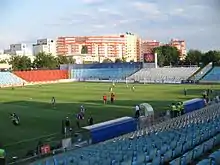stadion
English
Etymology
From Ancient Greek στάδιον (stádion).
Noun
stadion (plural stadia)
- A Greek unit of measurement, equivalent to six plethra or six hundred podes, which, though varying in precise length, is generally accepted to be equivalent to approximately 185·4 metres.
- 1883: Franz von Reber (translated by Joseph Thacher Clarke), History of ancient art, p257 (S. Low…)
- The stadion did not suffice for the races of horses and chariots which had been favorites with the Greeks since the Trojan war.
- 1993: David Gilman Romano, Athletics and Mathematics in Archaic Corinth: The Origins of the Greek Stadion, p1 (Diane Publishing Co.; →ISBN (10), →ISBN (13))
- The stadion was used specifically for human athletic contests whereas the Greek hippodrome and later the Roman circus were used for equestrian events. The gymnasion and the palaistra were used for training purposes for human athletic events.
- 2001: Edward Seldon Sears, Running Through the Ages, p26 (McFarland, →ISBN
- Stadion Race (200 meters)
- The winner of the Stadion race could justifiably be called the fastest man in the Greek world. According to legend, Herakles, whose feet were 0·32 meters (12·7 inches) long, stepped-off the Stadion at Olympia. Since he chose a distance of 600 “feet”, this made the race at Olympia 192 meters. Herakles staged a race for his brothers, the Kouretes, and crowned the victor with a branch of wild olive. Although the Greek Stadion race was always 600 feet, other Greek gods had “feet” of different lengths. This caused the length of the Stadion race to vary slightly from stadium to stadium. This list of Olympic victors compiled by Hippias in about 400 B.C. lists the Stadion race as the only event in the first 13 Olympic games. Coreobus of Elis, a cook, was the victor in the Stadion race in 776 B.C. and thus the first recorded Olympic victor.
- Stadion Race (200 meters)
- 1883: Franz von Reber (translated by Joseph Thacher Clarke), History of ancient art, p257 (S. Low…)
Translations
Greek unit of measurement
|
Related terms
Danish
Noun
stadion n (definite singular stadionet, indefinite plural stadioner / stadions, definite plural stadionerne)
- a stadium (sporting venue)
Dutch
Pronunciation
audio (file) - Hyphenation: sta‧di‧on
Finnish
Etymology
From Ancient Greek στάδιον (stádion).
Declension
| Inflection of stadion (Kotus type 6/paperi, no gradation) | |||
|---|---|---|---|
| nominative | stadion | stadionit | |
| genitive | stadionin | stadionien stadioneiden stadioneitten | |
| partitive | stadionia | stadioneita stadioneja | |
| illative | stadioniin | stadioneihin | |
| singular | plural | ||
| nominative | stadion | stadionit | |
| accusative | nom. | stadion | stadionit |
| gen. | stadionin | ||
| genitive | stadionin | stadionien stadioneiden stadioneitten | |
| partitive | stadionia | stadioneita stadioneja | |
| inessive | stadionissa | stadioneissa | |
| elative | stadionista | stadioneista | |
| illative | stadioniin | stadioneihin | |
| adessive | stadionilla | stadioneilla | |
| ablative | stadionilta | stadioneilta | |
| allative | stadionille | stadioneille | |
| essive | stadionina | stadioneina | |
| translative | stadioniksi | stadioneiksi | |
| instructive | — | stadionein | |
| abessive | stadionitta | stadioneitta | |
| comitative | — | stadioneineen | |
Hungarian
Etymology
From German Stadion (“stadium”), from Ancient Greek στάδιον (stádion).[1]
Pronunciation
- IPA(key): [ˈʃtɒdiʲon]
- Hyphenation: sta‧di‧on
Declension
| Inflection (stem in -o-, back harmony) | ||
|---|---|---|
| singular | plural | |
| nominative | stadion | stadionok |
| accusative | stadiont | stadionokat |
| dative | stadionnak | stadionoknak |
| instrumental | stadionnal | stadionokkal |
| causal-final | stadionért | stadionokért |
| translative | stadionná | stadionokká |
| terminative | stadionig | stadionokig |
| essive-formal | stadionként | stadionokként |
| essive-modal | — | — |
| inessive | stadionban | stadionokban |
| superessive | stadionon | stadionokon |
| adessive | stadionnál | stadionoknál |
| illative | stadionba | stadionokba |
| sublative | stadionra | stadionokra |
| allative | stadionhoz | stadionokhoz |
| elative | stadionból | stadionokból |
| delative | stadionról | stadionokról |
| ablative | stadiontól | stadionoktól |
| Possessive forms of stadion | ||
|---|---|---|
| possessor | single possession | multiple possessions |
| 1st person sing. | stadionom | stadionjaim |
| 2nd person sing. | stadionod | stadionjaid |
| 3rd person sing. | stadionja | stadionjai |
| 1st person plural | stadionunk | stadionjaink |
| 2nd person plural | stadionotok | stadionjaitok |
| 3rd person plural | stadionjuk | stadionjaik |
Derived terms
- labdarúgó-stadion
References
- Zaicz, Gábor. Etimológiai szótár: Magyar szavak és toldalékok eredete (’Dictionary of Etymology: The origin of Hungarian words and affixes’). Budapest: Tinta Könyvkiadó, 2006, →ISBN
Norwegian Bokmål
Noun
stadion n (definite singular stadionet, indefinite plural stadion / stadioner, definite plural stadiona / stadionene)
- a stadium (sporting venue)
Norwegian Nynorsk
Polish

stadion
Romanian

stadion
Declension
declension of stadion
| singular | plural | |||
|---|---|---|---|---|
| indefinite articulation | definite articulation | indefinite articulation | definite articulation | |
| nominative/accusative | (un) stadion | stadionul | (niște) stadioane | stadioanele |
| genitive/dative | (unui) stadion | stadionului | (unor) stadioane | stadioanelor |
| vocative | stadionule | stadioanelor | ||
Serbo-Croatian
Etymology
From Ancient Greek στάδιον (stádion).
Swedish
Noun
stadion n or c (definite singular stadion, indefinite plural stadion, definite plural stadion)
- a stadium (sporting venue)
This article is issued from Wiktionary. The text is licensed under Creative Commons - Attribution - Sharealike. Additional terms may apply for the media files.